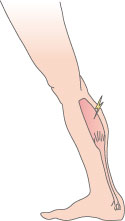Definition and causes of muscle spasms

Cramps can be relieved by stretching
or massage
All people will suffer spasms or cramps in a muscle from time to time. It is spasm of muscle fibers that causes the muscle to contract and become hard and sore. Usually a spasm lasts only for a couple of minutes before it subsides.
Muscle spasms are largely due to the muscles not getting enough supply of oxygen, and thus accumulate toxic waste, causing severe muscle contractions.
Therefore most muscle spasms are related to sports or other physical exercise. Dehydration and a skewed salt balance can also result in spasms. Sitting or lying down for a longer time with a muscle in an abnormal position may cause spasms when the muscle is reactivated. Usually there is no underlying cause for the spasm in such situations.
Muscle spasms can occur in all muscles but are seen most frequently in the leg muscles.
The vast majority of spasms are not a sign of illness, but if you are prone to spasms during rest, for example at night, it may be an early sign of a disease.
Painful spasms in the calf muscles during walk may for example be symptom of atherosclerosis where the arteries are becoming blocked.
Symptoms of muscle spasms
The immediate symptom of muscle spasm is a sudden pain in the affected muscle. The muscle will be readily visible under the skin where it has contracted strongly. When touching, it feels hard, tense and sore. It is not possible, as it usually is, with will power to relax the affected muscle.
Prevention and treatment of muscle spasms
In most cases a muscle spasm will not last more than a few minutes and leaves no subsequent problems. Before sports activity, it is important to warm up the muscles thoroughly. It can be done with a combination of active warming up and stretching exercises. To prevent muscle spasms, it is also important to have taken plenty of fluids before the sports activity.
In case of muscle spasms treatment with massage and stretching will often solve the problem. Consumption of fluid and salt can prevent further spasms during the sport activity
If you are subject to frequent nocturnal muscle spasms or restlessness in the legs, which is not due to other illness, your doctor may prescribe a quinine based medication. The substance is an anti-malaria agent, but in small doses, it works against muscle spasms.
Læs denne artikel på dansk |